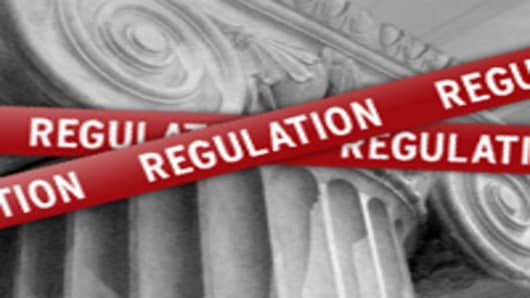A Senate Republican has called for the "strongest" derivatives rules, signaling that Democrats may get the votes needed to start debating their sweeping financial regulation bill Monday.
Just days before the Senate was due to vote to start working on Democrats' legislation, Sen. Olympia Snowe said that strong derivatives regulation goes to the heart of an effective financial reform bill.
"If we are to effectively regulate the derivatives market, we must start the Senate floor debate with the strongest proposal we can craft and defend against the inevitable attempts to weaken it," Snowe told Senate Majority Leader Harry Reid in a letter dated Friday.
Democrats need to convince at least one of the 41 Republican senators to vote with them in order to start debating a bill to impose new rules for the financial system.
Senator Bob Corker, a key Republican involved in discussions on financial reform legislation, said Sunday it was "very likely" his party would block a vote on the bill if a bipartisan deal is not reached before the bill is brought to the Senate floor.
"I want to see a bill. I think we do need to address re-regulation in our financial markets," Corker told ABC's "This Week" program.
Asked if Republicans would stand together to block the bill from moving to the floor if an agreement is not reached ahead of time, Corker replied, "I think it's very likely."
"It's very important that we reach that bipartisan agreement first," he said.
Snowe and other moderate Republicans such as Susan Collins are under pressure from the White House to support Democrats' efforts to overhaul the financial system.
Although Republicans had vowed Friday to oppose Democrats' efforts until the sides were able to reach a bipartisan agreement, public anger over Wall Street's taxpayer bailout and Goldman Sachs' alleged fraud may force Republicans' hand.
The bill written by Senate Banking Chairman Christopher Dodd would rein in banks, bring new oversight for hedge funds and derivatives and usher in new rules to protect consumers from risky financial products.
Dodd and the top Republican on his committee, Richard Shelby, have been trying to reach an agreement. As of Saturday mid-afternoon, no real progress had been made, sources said.
Some of the sticking points include how to ensure that taxpayers are not on the hook to rescue troubled financial firms such as what happened with AIG and Bank of America .
Clearinghouses to be Included
Senate aides have also been trying to hash out how best to rein in derivatives trading. The Senate package likely will require most over-the-counter swaps to move through clearinghouses to limit the domino effect large, risky trades can have on the economy.
Less clear is whether a proposal to severely curb big banks' participation will remain in the final Senate bill.
Sen. Blanche Lincoln, chairman of the Senate Agriculture Committee, shocked markets with the proposal to effectively bar banks from the $460 trillion market. Dodd's derivatives proposal did not go that far.
In her letter to Reid, Snowe skirts the controversial issue of requiring banks to spin off their swaps desks. Instead she pushes for more transparency and said any exemptions to the new derivative rules must be narrowly constructed.
Lincoln's proposal has been viewed by many observers as a bargaining chip that would allow for the bulk of her derivatives proposal to remain intact—and to score points with voters ahead of midterm November elections.
"If it weren't an election year, I would be telling you ... that (the measure) would not survive" into the final Senate bill, said Joel Telpner, partner with law firm Jones Day in New York.
"But given that it's an election year and it's coming on the heels of the Goldman situation , maybe it will have more leg," he said.


